
The human gut microbiota is a highly complex ecosystem consisting of communities of microorganisms that interact with each other and with their host. Specific physiologic features of this relationship include the development of innate and adaptive immunity, relative susceptibilities to infections, immune tolerance, bioavailability of nutrients, and intestinal barrier function.
The use of antibiotics may have the undesirable effect of temporarily or permanently disturbing the microbial environment and promoting the emergence of opportunistic infections such as Clostridium difficile, affect weight and obesity and even influence mental health. Researchers and healthcare practitioners have considered the administration of probiotic supplementation a potentially important treatment for addressing antibiotic induced microbiota disturbances, with a variety of species and strains studied. Given the complex nature and diversity of the human microbial system it makes sense to consider a broad spectrum, multispecies probiotic supplement when supporting patients during and after antibiotics treatment. Combinations of different species and strains may better replicate the ecological nature of the human gut microbiota with the potential to maximise sustainable beneficial functions.
In this infographic we explore the effects of antibiotics on the human gut microbiota and review those studies exploring the benefits offered from probiotic supplements.
References
- Everything you always wanted to know about the gut microbiota… Gut microbiota watch 2015. Viewed 4 November 2015, http://www. gutmicrobiotawatch.org/en/gut-microbiota-info/
- Montiel-Castro AJ, Gonzalez-Cervantes RM, Bravo-Ruiseco G, et al. The microbiota-gut-brain axis: neurobehavioral correlates, health and sociality. Front Integr Neurosci 2013;7:70. [Full text]
- Martinez I, Stegen JC, Maldonado-Gomez, et al. The gut microbiota of rural Papua New Guineans: composition, diversity patterns, and ecological processes. Cell Reports 2015;11(4):527-238. [Full text]
- Arumugam M, Raes J, Pelletier E, et al. Enterotypes of the human gut microbiome. Nature 2011;473(7346):174-180. [Abstract]
- Beirao EM, Padovan ACB, Furtado JJD, et al. Does the change on gastrointestinal tract microbiome affects host? Bra J Infect Dis 2014;18(6). [Full text]
- Peterson LW, Artis D. Intestinal epithelial cells: regulators of barrier function and immune homeostasis. Nature Reviews Immunol 2014;14:141-153. [Abstract]
- Anderson JM, Van Itallie CM. Physiology and function of the tight junction. Cold Spring Harb Perspect Biol 2009;1(2):a002584. [Full text]
- Dethlefsen L, Huse S, Sogin ML, et al. The pervasive effects of an antibiotic on the human gut microbiota, as revealed by deep 16S rRNA sequencing. PLoS Biol 2008;6(11):e2810. [Full text]
- Jakobsson HE, Jernberg C, Andersson AF, et al. Short-term antibiotic treatment has differing long-term impacts on the human throat and gut microbiome. PLoS One 2010; DOI:10.1371/journal.pone.0009836. [Full text]
- Wlodarska M, Finlay BB. Host immune response to antibiotic perturbation of the microbiota. Nature 2010;3(2):100-103. [Full text]
- Van Boeckel TP, Gandra S, Ashok A, et al. Global antibiotic consumption 2000 to 2010: an analysis of national pharmaceutical sales data. Lancet 2014;14(8):742-750. [Abstract]
- Zaura E, Brandt BW, de Mattos JT, et al. Same exposure but two radically different responses to antibiotics resilience of the salivary microbiome versus long-term microbial shifts in feces. Bio 2015;6(6):e01693-e01615. [Full text]
- Jernberg C, Lofmark S, Edlund C, et al. Long-term impacts of antibiotic exposure on the human intestinal microbiota. Microbiology 2010;156:3216-3223. [Abstract]
This image by FX Medicine is licensed under a Creative Commons Attribution-NonCommercial-NoDerivatives 4.0 International License.
More information about how to share/use the infographics for personal use.
If you interested in using any FX Medicine content for commercial use please contact us.
DISCLAIMER:
The information provided on FX Medicine is for educational and informational purposes only. The information provided on this site is not, nor is it intended to be, a substitute for professional advice or care. Please seek the advice of a qualified health care professional in the event something you have read here raises questions or concerns regarding your health.




